Welcome to Card Game DB
Register now to gain access to all of our features. Once registered and logged in, you will be able to create topics, post replies to existing threads, give reputation to your fellow members, get your own private messenger, post status updates, manage your profile and so much more. If you already have an account, login here - otherwise create an account for free today!
Register now to gain access to all of our features. Once registered and logged in, you will be able to create topics, post replies to existing threads, give reputation to your fellow members, get your own private messenger, post status updates, manage your profile and so much more. If you already have an account, login here - otherwise create an account for free today!
Forging Your Fellowship 2: Like a Dwarf - Direct Assault
Jul 05 2012 05:00 AM |
sirprim
in Lord of the Rings
Forging Your Fellowship deckbuilding sirprim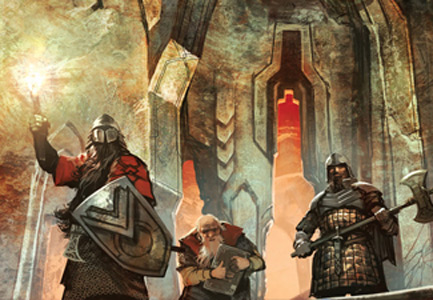 Forging your fellowship is a series about how I approach deckbuilding in LotR:LCG.
Forging your fellowship is a series about how I approach deckbuilding in LotR:LCG. I know that there are many ways to skin a cat (or Wargs (Core) for that matter) and I do not claim that my view are the end all be all way of deckbuilding. But maybe I can still get you to follow along and walk the path with me as I share my ideas.
Hello readers,
in last weeks article I talked about the different approaches, when examining the cards you want to put in your deck. The approach I choose for deckbuilding boils down (on a very condensed level) to these three basic questions:
1. How does my deck deal with locations?
2. How does my deck deal with enemies?
3. How does my deck deal with treacheries?
There is one point I have to pick up from last week as my article seemed to be a bit misleading: I am not specifically talking about building a solo deck (though possible). But if you want to synchronize your deck with your partner(s), you can very well interchange the questions with "How do our decks deal with locations?" at no additional cost.
Additionally I am not trying to build decks for a certain scenario (so far), so these questions are meant to be answered on a general scale. Hope this clarifies a bit.
But we've got to make a small addition, because no quest is ever going to be won, if you don't make any quest progress at all. Now considering how the mechanics of locations are integrated into this game (locations in the staging area reduce quest progress, active locations absorb quest progress, which in turn leads to exploring those locations) it is safe to say that these pieces are highly linked with each other. And for the sake of simplicity I will address these as one single question. But the focus of my articles still lies more on locations rather than quest progress, because once I know how to deal with locations there is likely going to be a point of quest progress to be gained here and there.
Ok, we got our questions, what next?
We need some answers!
The first possible answer to all three questions is: hard-countering.
I define hard-countering as follows: Getting rid of a certain card by direct means. (That's pretty straightforward and I guess many people are in the same boat here.)
Ho, don't stand in my way, I am your deck and I am ready to ...
... hard-counter enemies
Hard-countering enemies can currently be achieved by two ways: You can kill enemies via combat by dealing damage equal to or more than their hit points through your attacks (like attacking a King Spider (Core) with a wounded Gimli (Core)) or by dealing this damage via more direct means like Swift Strike (Core) or a mixture of those. Both methods have in common that you get rid of your foe for good. On the other hand killing them in combat is (hopefully) repeatable with future enemies, while the direct damage approach often has the benefit of you suffering through less attacks before the bad guys leave the stage.
... hard-counter locations
In order to get rid of locations the direct way, you can either apply plenty of willpower to questing, explore the active location that way, travel to a new one, rinse and repeat or you can place progress tokens on those locations while they are still in the staging area with cards like Northern Tracker (Core) or The Riddermark's Finest (THoEM). Removing locations via questing is the most basic approach, but exploring them in the staging area has the added value of avoiding (mostly unpleasant) travel effects at the cost of either being one-shot (Riddermark) or slow (Northern Tracker) (... who designed Asfaloth (FoS) by the way? Card is breathtakingly strong).
... hard-counter treacheries
Ah, that's a good one. The encounter deck wants to discard all your events? (Eyes of the Forest (Core)) No! You shall raise your threat by 8? (Gollum's Anguish (RtM)) No! Deal 2 damage to plenty of characters? (Exhaustion (AJtR)) No! The card I am getting at, is very likely on everybodies mind already and it is the only card for hard-countering treacheries so far, peoples all time favorite: A Test of Will (Core)! Well, what can I say, this card is a staple in many a deck and rightly so.
Honorable mentions go to the Miner of the Iron Hills (Core), who is a hard-counter to a subset of treacheries, but unfortunately may find no targets for his ability in many quests. Now I hear you thinking: Don't ignore Eleanor (Core)! You can rest assured, I am not going to ignore her, but for the sake of my theory she is not a hard-counter, because she replaces the card with another one. That is a good enough effect in its own right and I will come back to her in later articles.
Hard-countering is probably so obvious that it doesn't justify a name on its own and it is the first strategy almost everybody is using anyway, so why am I telling you all this obvious stuff? Well, in future articles I will give more answers to the three basic questions outlined before and I hope that it all will make sense then. I promise you that it is going to get more interesting soon *g*
So long,
Sebastian
- rustylantern and Reager like this



 Sign In
Sign In Create Account
Create Account
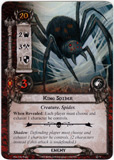
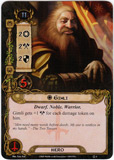
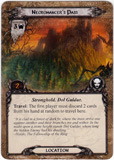
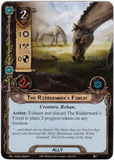
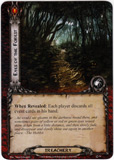
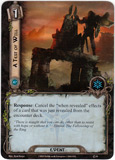











7 Comments
I guess what I am trying to say is: If you find some aspects of your deck frustrating, because it lacks power in certain aspects, try to patch some of your weaknesses without losing your focus on your main strength. If you want I can have a look at your deck (just post it here on the site) or send me a message, if you have some questions.
And you might be onto something concerning the future articles
I completely agree there. Deckbuilding is much more challenging in solo play that in the multiplayer game, and with the expanded card pool it is even more difficult to "trim the fat", so to speak, from your deck to get down to that 50 card mark. For now, I am abandoning the Dwarves just so I can get a fresh perspective on the game and experiment with some cards that I haven't played with before. I am hoping to post a finished deck soon, with constructive feedback welcome.